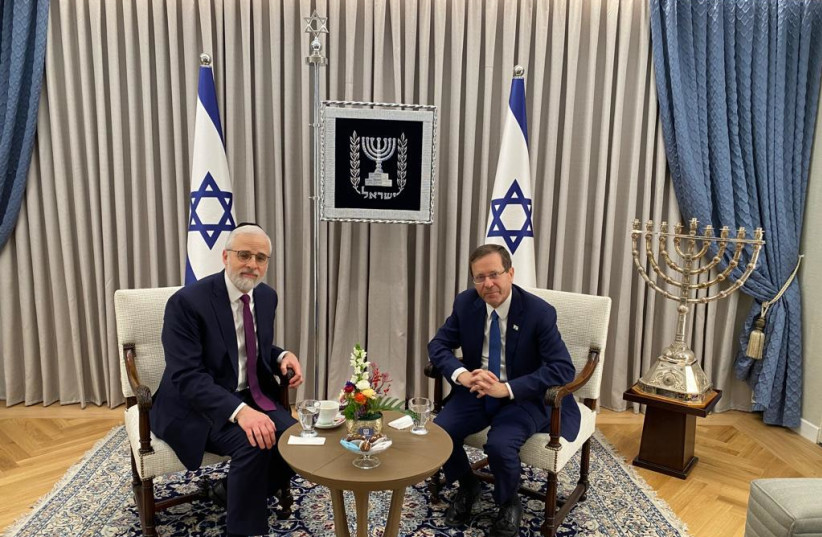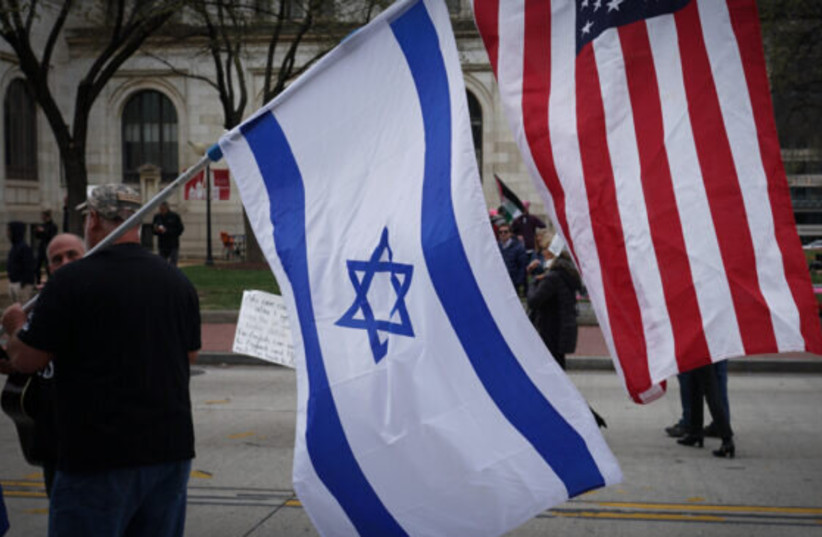As the rift between Jews in Israel deepens, the head of one of the strongest Jewish-American organizations has called for peaceful dialogue between brothers.
“I have fundamental differences with [Union for Reform Judaism president] Rabbi [Rick] Jacobs and I’ve expressed them to him many times,” Rabbi Moshe Hauer, executive vice president of the Orthodox Union told The Jerusalem Post this week. But “by talking to him, my principles have not shifted at all.”
Hauer and Jacobs sat together during the Conference of Presidents of Major Jewish Organizations delegation to Jerusalem this week.
He explained that there is a “pragmatism of understanding that there are Jews with different backgrounds and different belief systems, and we are committed.”

“[There are] two fundamental orthodoxies... One is that we believe in the Torah as the eternal and unchangeable Word of God. And the other one is that we believe a Jew is always a Jew. The particular choices which they make don’t matter, as well as the affiliations or their level of observance. Those changes do not make a difference, and we have to convey both commitments simultaneously.”
Rabbi Moshe Hauer
Hauer added that the OU runs by the logic that there are “two fundamental ideas: the first, that we believe in the Torah as the eternal and unchangeable word of God, and the second, that we believe a Jew is always a Jew. The particular choices which they make don’t matter, neither do affiliations or their level of observance.”
He added that the issue of the Torah as the word of God “is the one which makes it into the newspapers, because it’s the Orthodox counterculture; there are things which society has adapted that we cannot and will not adapt, some of which are championed by other Jewish movements. We will not join them, but the commitment to brotherhood is there, and that combination is possible and will enable us to advance.”
Asked if this type of dialogue could also happen in Israel, which lacks a history of rabbis from different streams cooperating with each other, Hauer said he thinks “it will be far more likely for it to happen here when the level of agitation is lower. We have a much lower level of drama on the American side, and this enables us to speak.”
The OU met with many political parties, including the ultra-Orthodox parties and the Religious Zionist Party, one that many Jewish-American organizations have decided to ban until further notice.
Rabbi Hauer on working towards consensus
“As we made the point of meeting many members of the past government, we did not limit ourselves from meeting with people who we didn’t agree with their politics,” Hauer said carefully.
“We didn’t agree with their vision for the Jewish character of the state,” he said of the outgoing government, headed by Yair Lapid and Naftali Bennett, but “we still met them. The State of Israel is a critical part of the future of the Jewish people, and the decision-makers need to be interacting with the Jewish community,” and vice versa.

“The State of Israel has been literally a godsend in providing a tremendous source of Jewish connection, Jewish pride, Jewish activity, that has indeed animated large portions of the Jewish community and therefore, preserving and strengthening this connection is critical,” Hauer said.
But, he added, “the enhancement of the Jewish character of the state is something which can be accomplished, without alienation of others,” referring to statements made towards liberal Jews on the one hand and ultra-Orthodox Jews on the other.
“In a dramatic context in which we find ourselves, where people are pitted against each other, and making it a war over the soul of the future of the Jewish state – it’s very difficult to accomplish that.
Hauer said that the “mix” of Judaism “with power,” is very difficult,” and “sometimes creates fear.” According to Hauer, the issue of the Jewish character of the State of Israel “should be one of those issues of common cause,” and “the issue of the Jewish state as a source of strong and welcoming identities to American Jews across the board, should be an issue of common cause.
We’re very dedicated to trying to reduce the conflict around it and to increase the appeal around us.”
Hauer joined the OU as its executive vice president in 2020, serving as the organization’s rabbinic leader, heading its community efforts, and serving as its professional religious-policy leader and primary spokesman. Prior to joining the OU, Hauer served as the senior rabbi of the Bnai Jacob Shaarei Zion Congregation in Baltimore, Maryland, for 26 years.
